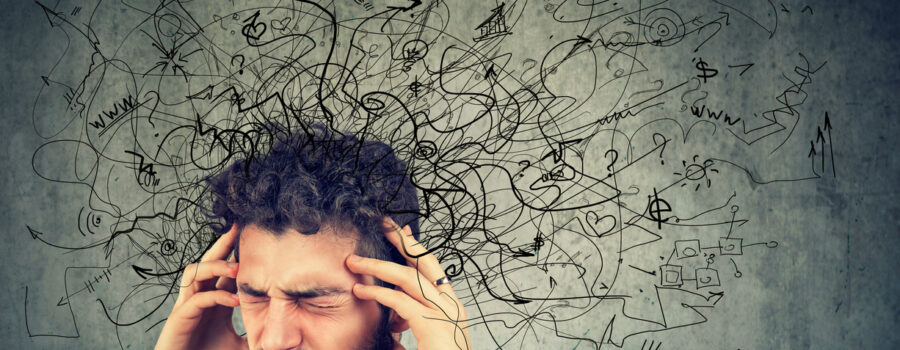Tackling the Stigmas of Anxiety
Anxiety has become such a buzz-worthy term in the coming years, due to the growing acceptance of mental health awareness, I think it is appropriate to define exactly what anxiety is. According to Websters Dictionary, Anxiety is “a feeling of worry, nervousness, or unease, typically about an imminent event or something with an uncertain outcome.” I would be hard pressed to find someone in the general population who has never experienced this feeling in one way or another. Within Georgia, including the metro Atlanta area, anxiety is the most common mental health issue in the state. You could feel anxious about a big presentation coming up at work or school, an event you are attending with lots of people, moving to a new city, starting a new job, or landing an interview. It’s the magnitude of the anxiety, the severity in which it impacts your everyday life, and how you handle this anxiety that determines weather or not you should seek help for your anxiety. Clinically speaking, Anxiety Disorders have over 10 specific diagnosis’ within the DSM-5, including Social Anxiety Disorder, Panic Disorder, and Generalized Anxiety Disorder. Many people experience the common symptoms of anxiety including fatigue, restlessness, sweating, lack of concentration, racing thoughts, unwanted thoughts, hyper vigilance, irritability, inability to put aside a thought, tremendous stress that does not match the situation, excessive worry, fear, feeling of impending doom, insomnia, nausea, palpitations, feeling of panic attacks, or trembling. Its how we handle these feelings that determines whether or not we need to seek help with this anxiety.
or unease, typically about an imminent event or something with an uncertain outcome.” I would be hard pressed to find someone in the general population who has never experienced this feeling in one way or another. Within Georgia, including the metro Atlanta area, anxiety is the most common mental health issue in the state. You could feel anxious about a big presentation coming up at work or school, an event you are attending with lots of people, moving to a new city, starting a new job, or landing an interview. It’s the magnitude of the anxiety, the severity in which it impacts your everyday life, and how you handle this anxiety that determines weather or not you should seek help for your anxiety. Clinically speaking, Anxiety Disorders have over 10 specific diagnosis’ within the DSM-5, including Social Anxiety Disorder, Panic Disorder, and Generalized Anxiety Disorder. Many people experience the common symptoms of anxiety including fatigue, restlessness, sweating, lack of concentration, racing thoughts, unwanted thoughts, hyper vigilance, irritability, inability to put aside a thought, tremendous stress that does not match the situation, excessive worry, fear, feeling of impending doom, insomnia, nausea, palpitations, feeling of panic attacks, or trembling. Its how we handle these feelings that determines whether or not we need to seek help with this anxiety.
How to Know When to Seek Help for Your Anxiety
Some common unhealthy coping mechanisms many people use to “deal” with their anxiety is avoidance, drinking, smoking, drugs, compulsive spending, compulsive eating, or not eating enough, exessive use of caffeine, self medicating with unprescribed medicine or drugs, risky behavior, excessive working out, oversleeping, or not sleeping at all. Usually, these unhealthy coping strategies are signs that you are in need of help with your anxiety. Although these behaviors are unhealthy attempts, it still shows an attempt to solve the problem, and a sign that you acknowledge that something is indeed wrong. Undoubtably, these unhealthy mechanisms ultimately fail to treat the source of the issue, and sometimes even go as far as making it worse. Healthy mechanisms for anxiety, worry, and stress include giving yourself a “time out” everyday, which can include meditation, yoga, get a massage, or listen to music. Another healthy way you can ease the stress is to make sure you are eating healthy, well-balanced meals everyday, sleeping 8 hours a day, limiting alcohol, caffeine, and drugs, exercising for at least 30 minutes a day, practicing deep breathing exercises, drinking enough water, and maintaining a positive attitude. Often, people who are in need of the most help with their stress and anxiety hold in their feelings and thoughts for fear of sounding weak, out of control, or “crazy”. Lastly, and most importantly, talking with someone about your worry, stress, or anxiety can be extremely helpful in putting your mind at ease.
How to Seek Help for your Anxiety
Anxiety looks different within every individual who experiences it. Maybe you only worry about large, seemingly impossible tasks, or maybe you constantly obsess and become anxious about every little detail within your life. In the greater Atlanta area, particularly Fayetteville, Ga, there are a number of mental health options for those  seeking help with anxiety. Seeing a therapist about your stress and worries, even if you think you don’t have a clinical anxiety disorder, can only alieviate your mental health. Studies show that within Georgia, which includes the Fayetteville area, 46% of people will develop a mental illness during their lifetime. Seeking help with anxiety from a third party who knows nothing of the situation outside of what you tell them is helpful in more ways than one. With knowing a little more about anxiety, how do you find help with it? Sure, friends can be great listeners, but a professional can help you find the best way to deal with your anxiety in a healthy, individualized way for your unique self. Try doing a quick google search from your smart phone or laptop of therapists in your area that treat anxiety. Chances are there are a heap to choose from. A quick phrase like “help with anxiety in Fayetteville, Ga” should launch you in the right direction. Research prices, research common anxiety treatments, know if you are more comfortable talking with a man or a woman, you have a choice when it comes to your therapist! It’s okay to be picky!
seeking help with anxiety. Seeing a therapist about your stress and worries, even if you think you don’t have a clinical anxiety disorder, can only alieviate your mental health. Studies show that within Georgia, which includes the Fayetteville area, 46% of people will develop a mental illness during their lifetime. Seeking help with anxiety from a third party who knows nothing of the situation outside of what you tell them is helpful in more ways than one. With knowing a little more about anxiety, how do you find help with it? Sure, friends can be great listeners, but a professional can help you find the best way to deal with your anxiety in a healthy, individualized way for your unique self. Try doing a quick google search from your smart phone or laptop of therapists in your area that treat anxiety. Chances are there are a heap to choose from. A quick phrase like “help with anxiety in Fayetteville, Ga” should launch you in the right direction. Research prices, research common anxiety treatments, know if you are more comfortable talking with a man or a woman, you have a choice when it comes to your therapist! It’s okay to be picky!
Book Now!
Sources:
https://www.ncbi.nlm.nih.gov/pmc/articles/PMC3654957/
https://www.mayoclinic.org/diseases-conditions/anxiety/symptoms-causes/syc-20350961
https://www.merriam-webster.com/dictionary/anxious





You must be logged in to post a comment.